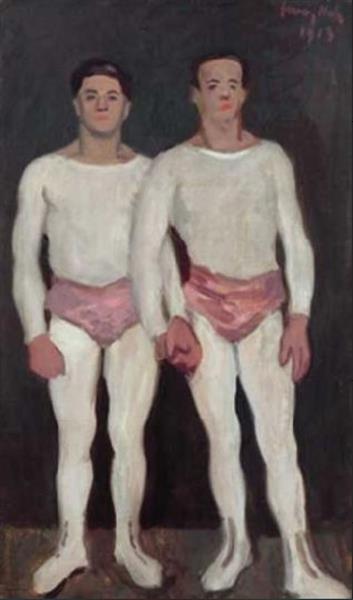Description
The art of Károly Ferenczy is a testimony of splendor and the vibrant artistic life of the Hungary of the early twentieth century. In his work "Artisták 1913" (artists 1913), the painter offers us a window to the world of artists of his time through a representation that stands out for its dynamic composition and intricate use of color.
The first characteristic that is observed by observing "Artisták 1913" is the disposition and interaction of human figures. Ferenczy paints a scene with several characters distributed harmoniously, creating a sense of movement and vitality. The figures seem immersed in their thoughts and activities, which suggests a hidden narrative that invites the viewer to enter the world created by the artist. It is remarkable how Ferenczy uses poses and gestures to transmit an atmosphere of concentration and dedication, probably capturing an artist meeting or a moment of creative contemplation.
The use of color in this work is particularly striking. Ferenczy uses a varied but balanced palette that includes earthly and warm tones, along with brightest brushstrokes that provide a delicate contrast. The colors used both in the background and in the clothing and skins of the characters create a harmonious balance, providing a feeling of totality and complexity to the paint. It is clear that Ferenczy had a deep knowledge of how colors can affect the perception and emotion of the viewer.
Another remarkable aspect in the work is the spatial composition. The painter achieves a balanced distribution of the elements on the canvas, with the background and the most disturbed elements to focus attention on the main figures. The perspective used by Ferenczy gives depth to the scene, allowing the viewer to feel that it can enter the paint and explore it at different levels.
Károly Ferenczy, as one of the most important artists of the Hungarian impressionist movement, sought to capture the essence of light and atmosphere in his works. This is evident in "Artisták 1913", where you can see your mastery in handling light and shadow to give life to the scene. The lighting seems naturally and carefully worked, subtly illuminating the faces and bodies of the characters and allowing certain details to excel clearly.
It is important to place this work in the context of the artistic career of Ferenczy and of the Impressionist movement itself in Hungary. Ferenczy was a central figure in the colonia of artists of Nagybánya (today Baia Mare, Romania), which was a fundamental nucleus for the evolution of impressionism and postimpressionism in Hungary. The influence of this artistic community is clear in "Artisták 1913", where you can see the impressionist techniques in the loose treatment of painting and attention to the effects of light.
In conclusion, "Artisták 1913" by Károly Ferenczy is a work that encapsulates not only the artist's technical ability, but also his ability to convey the essence of an artistic community and the creative environment of his time. The thorough composition, the expressive use of color and the careful attention to lighting, all is combined to make this painting a lasting testimony of the artistic legacy of Ferenczy and a precious example of Hungarian impressionism.
KUADROS ©, a famous paint on your wall.
Hand-made oil painting reproductions, with the quality of professional artists and the distinctive seal of KUADROS ©.
Art reproduction service with satisfaction guarantee. If you are not completely satisfied with the replica of your painting, we refund your money 100%.

